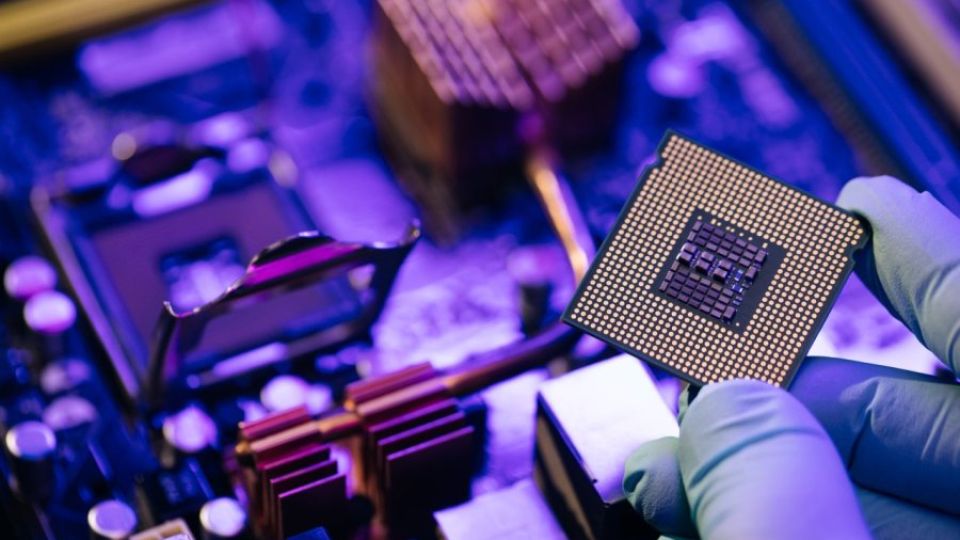August 10, 2023
SEOUL – South Korea’s semiconductor industry confronts a growing list of challenges as the global competition, compounded by the frictions between the US and China, intensifies amid a shortage of chip technicians, scientists and engineers.
As semiconductors are widely used for cutting-edge sectors such as artificial intelligence and mobile solutions, a host of countries including the US and China are vying to stay ahead in securing advanced facilities, workforce and technologies.
The US is building semiconductor factories and pouring money into the industry with the help of the CHIPS Act passed by Congress last year, while taking steps to restrict outbound investments in sensitive technologies to China.
The confrontation between the US and China over advanced technologies can generate collateral damage for export-dependent countries like Korea, as demonstrated by China’s announcement that it would limit the export of certain materials used for advanced semiconductors starting from this month.
Korean chipmakers such as Samsung Electronics find themselves in a difficult position regarding the fight between the US and China, as both countries are important export markets.
Worse, the domestic chip industry is still stuck in the protracted slump. The country’s exports fell for the 10th consecutive month in July due mainly to weak demand for semiconductors, according to the data compiled by the Ministry of Trade, Industry and Energy.
Outbound shipments fell 16.5 percent on-year to $50.33 billion last month, largely because exports of semiconductors, the country’s key export item, tanked nearly 34 percent on weak demand and a drop in chip prices.
In July, exports of chips fell 33.6 percent on-year to $7.44 billion, extending the on-year drop in chip sales since August last year.
The Korea Development Institute, a state-run think tank, said in a report released Monday that the chip sector’s slump is softening, signaling that the country may see a long-awaited rebound later this year.
The country’s chip sales remain crucial for overall trade figures and the broader economy, as a 10 percent decrease in exports of semiconductors leads to a 0.78 percent drop in Korea’s gross domestic product, according to the KDI.
But experts warn that Korean chipmakers still face a slew of problems. First, policymakers and chipmakers have to deal with the country’s dependence on memory chips, which accounted for 63.8 percent of outbound shipments of semiconductors in 2022.
There have been discussions about the need for diversifying chip portfolios, but specific policies and investment plans are yet to be mapped out, especially in consideration of shifts in chip-related technology trends.
Second, industry data shows that the country is witnessing a decline in inbound semiconductor equipment. Korea imported chip equipment valued at $16.6 billion in 2022, down 11 percent from the previous year. This is in contrast with the rise in chip manufacturing gear shipped to the US, Taiwan and Japan.
As the import of chipmaking machines is usually related to facility expansion, the drop in the related import figures is said to suggest a weak investment momentum.
Third, local chipmakers are reluctant to make aggressive investment to grapple with the escalating global competition. The prolonged slump is the main reason, but there are other factors. For instance, Samsung Electronics is planning to build a 300 trillion won ($227 billion) semiconductor cluster in Yongin, Gyeonggi Province, by 2042, but the company said securing industrial water and electricity is proving to be difficult.
Fourth, Korea has to take the workforce issue more seriously. Global chipmakers are aggressively recruiting chip engineers by promising big salaries, as a shortage of skilled workers hinders the operation of new chip manufacturing facilities. Over 60 new semiconductor facilities are under construction around the world, which in turn will translate to more competition to secure chip engineers in the coming years.
Against this backdrop, policymakers need to help chipmakers build new semiconductor facilities and overhaul education policies to nurture more engineers in a way that the domestic chip industry can stay competitive on the global market.


